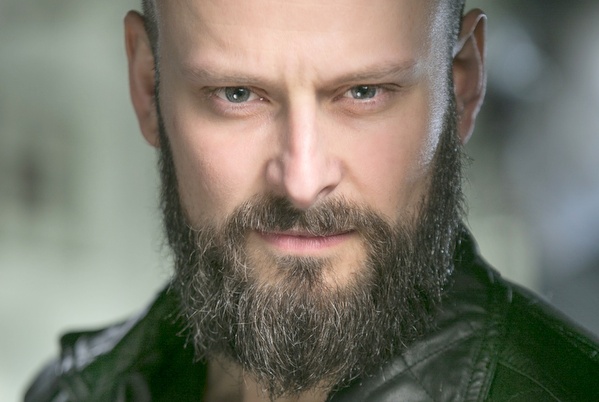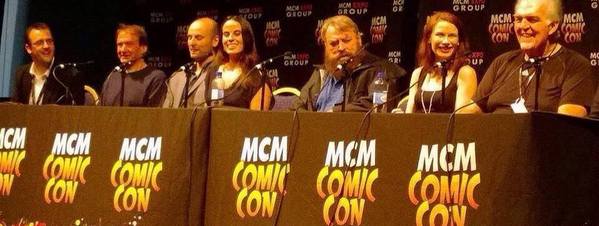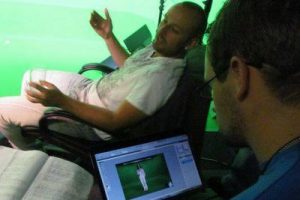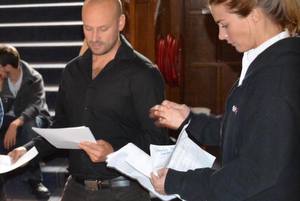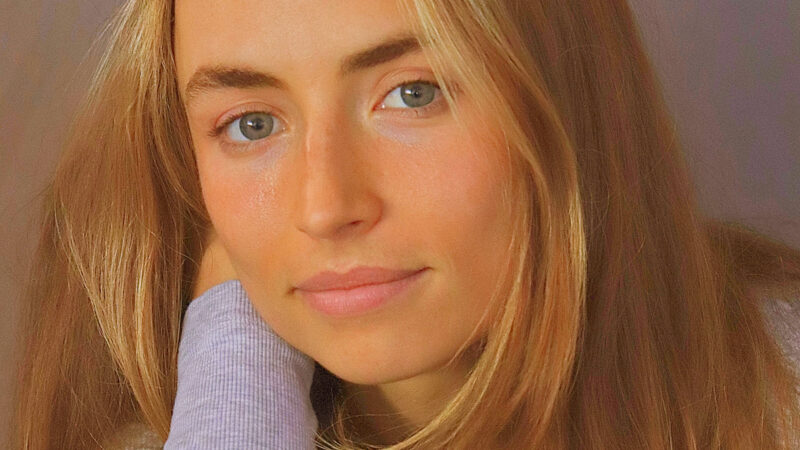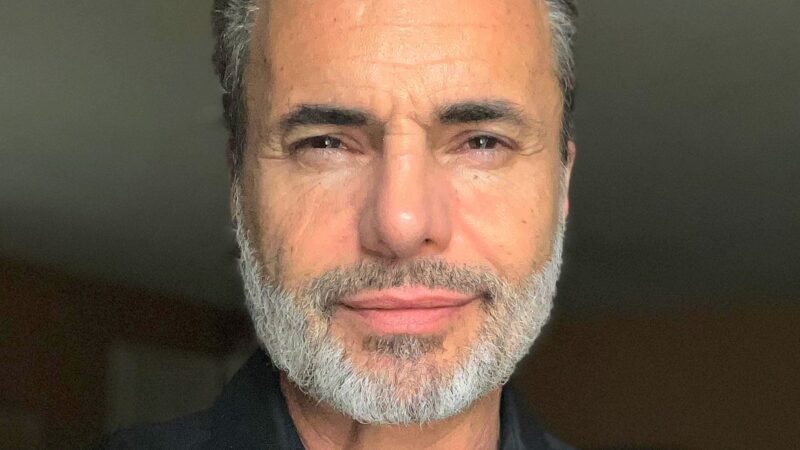I began with student performances before progressing to professional roles. One of my earlier roles which I’m most proud of was the role of John Proctor in ‘The Crucible’, a large challenge for a young actor but I had great people around me.
I’ve been lucky enough to work with some of the most talented cast and crews ranging from areas such as Britain, Hong Kong, America, Ireland and many more. One of my biggest influences was the talented director, Steven Nesbit, who took me under his wing and aided my growth as an actor which allowed me to work alongside talent such as the DoP Geoff Boyle. Steve taught me so much about how to act for camera and gave me the confidence to try different things. He’s a very generous director who will spend time with his actors.
At the start of my career a brilliant comedian offered me the opportunity to work for MTV BASE, acting in multiple comedy sketches with himself, Jason Lewis (Adulthood) & Daniel Kaluuya (Black Panther), which led to being cast in an MTV International Aids awareness film, both of which where shown globally. Throughout my career I’ve been fortunate enough to work with many talented people who are now life long friends. Film sets do that to people, it is so intense over the duration of the shoot that great friendships can become forged.
2016 I changed agents, this change combined with my management stateside has been brilliant. From starting the year filming for Netflix to then acting opposite Julianne Moore in Kingsman: The Golden Circle and Comedy Central. 2017 is looking to be just as exciting with roles opposite Bruce Campbell and Tara Reid to the release of Cain Hill horror with Gemma Atkinson.
How did you become an actor
It was at a family party, I was speaking with my cousins partner and he was telling me about his acting career. After that it was all I could think about, seeing his passion for acting just sparked mine. From then I messaged everyone I could to ask for advice. There are so many talented people out there who are willing to help if you just ask. Ross Boyask (director – Vengeance) met with me and spent hours of his time helping to guide me and I’m lucky enough all these years later to call him a friend. Actor/Producer Toby Richards has helped me with advice as well as roles in his productions which allowed me to work with people like Kevin McNally (Pirates of the Caribbean). Aml Ameen (Maze Runner) to this day is also a great encouragement, after working with Aml on his own project I got to see the dedication and skill for myself.
What acting technique do you use
I’m not an actor who will assign myself to any particular method, there is a time and place for each technique. If my character gets hit by a car… the method actor in me will not be up for getting run over for real. I remember reading an interview with Dustin Hoffman, he had stayed up 72 hours to achieve the insomnia look of his character, when he told Sir Laurence Olivier, he replied ‘My dear boy, why don’t you just try acting’.
I’d recommend learning about each technique and keep each one in a toolbox that you can call upon when you need to. Personally, I prefer to use method for emotional scenes but it is not as easy to walk away from once the scene is done.
What wrong impressions do actors hold about acting
I think one big misconception some actors have about acting is the difference between stage and screen. They are two different beasts, both take their own craftsmanship. On stage you need to be aware enough to make the performance big enough for all to see without taking away the realism of the play, whilst the wrong eyebrow twitch on a huge cinema screen and close up can completely change your character at that moment.
Do you take courses to improve your craft
Yes, it is important to consistently improve. Watch films and steal from the best! Only attend recommended workshops, there are a lot of people just trying to take advantage of your commitment to your craft. Because of my type cast I’m currently learning new weapon skills for screen as well as horse riding.
What acting books do you read
Stanislavski ‘An Actor Prepares’ – Brendan McNamara: It’s an audition stupid, Nancy Bishop’s books. A hero with a thousand faces. I will always read books by casting directors and biographies from successful actors. Michael Caine’s autobiography and Nick Frost’s because it’s inspirational to read about talent coming through hardships and similar struggles.
How do you keep fit as an actor
Physically, I don’t have an option, a lot of my friends are fitness models, fighters and bodybuilders so I am lucky in that sense ( I don’t feel as lucky after a leg session). I train with Daniel Joseph who has recently been awarded 4th place at the O2 and Damar Martin (Gladiators) 9 time bodybuilding champion.
How do you prepare for a role when you get it
After the celebration…I will read the script front to back. I’ll then highlight all my lines before making notes on the script for each scene I am in. Working out the motivation and characters goals in each scene and how it relates or changes his overall goal. I’ll have a vision of my character but it will be fluid, I’m there to serve the director and the film so the director’s notes will play a part in the end decisions which means you can’t arrive with a locked character to meet with the director.
How do you create a character from a script into a person
Much like the previous answer really. I’ll look for their goals, short term and long term. Their relationship with the other characters and why it is that way. One of my favorite techniques is to hot seat, I’ll try to dress like the character and I’ll sit down as that role and talk to a friend or myself. Sometimes I will go out to the shops in character and interact in day to day situations (not always recommended with the castings I receive)
How do you stay fresh on set
It depends on the role. If I’m playing a real person, I will stay in character between takes, mainly out of fear of losing it. Accents I will keep between takes as well but if it is a fictional character with no accent I’m the one on a set pulling pranks and having a laugh. On the last shoot in an abandoned asylum shooting horror feature ‘Cain Hill’, I hid in an old wardrobe and scared the life out of our make up artist, George Moore.
Describe a memorable character you played
Leonard Kinster in Cain Hill, it was one of my most recent shoots from September 2016 but he was great fun to play. Leonard was the producer of the film crew exploring an old asylum. He’s a fast mouthed, smart arse who looks after number one. I’m a huge entourage fan so I kept thinking of Ari Gold!
Explain one creative choice you took on set
I work a lot with director Gene Fallaize so we have a short hand now and are 99% of the time on the exact same wave length for the character. He once gave me the direction to intimidate the other actor in the scene, I took this direction as a sign that he wanted me to get hands on and I launched the actor into the side of the van in the scene, the van was dented, the actor was in shock but completely fine and the shot looked great.
What do you want most from a director
Time! A director who takes the time to discuss the character with his cast, allows us the freedom to make choices. Too many directors focus on the shot, lighting etc but not the performances. It’s small things but a director saying well done or good take, that makes the difference. The minute a director makes their actors feel insecure about their performance is the same time his actors stop giving him choices.
What actors do you long to work with
It’s a long list but top of the list I’d say Tom Hanks and Helen Mirren
Why
Tom Hanks because he’s hugely talented but also comes across as a great person! Helen Mirren because she can do no wrong. Brilliant actor and she also seems like someone who has time for other people.
What advice would you give to actors
Learn every cast and crew members name. You’re all a team and it’s polite to address someone by their name. Plus the grips, sound recordists and make up artists usually have some of the best stories!!

